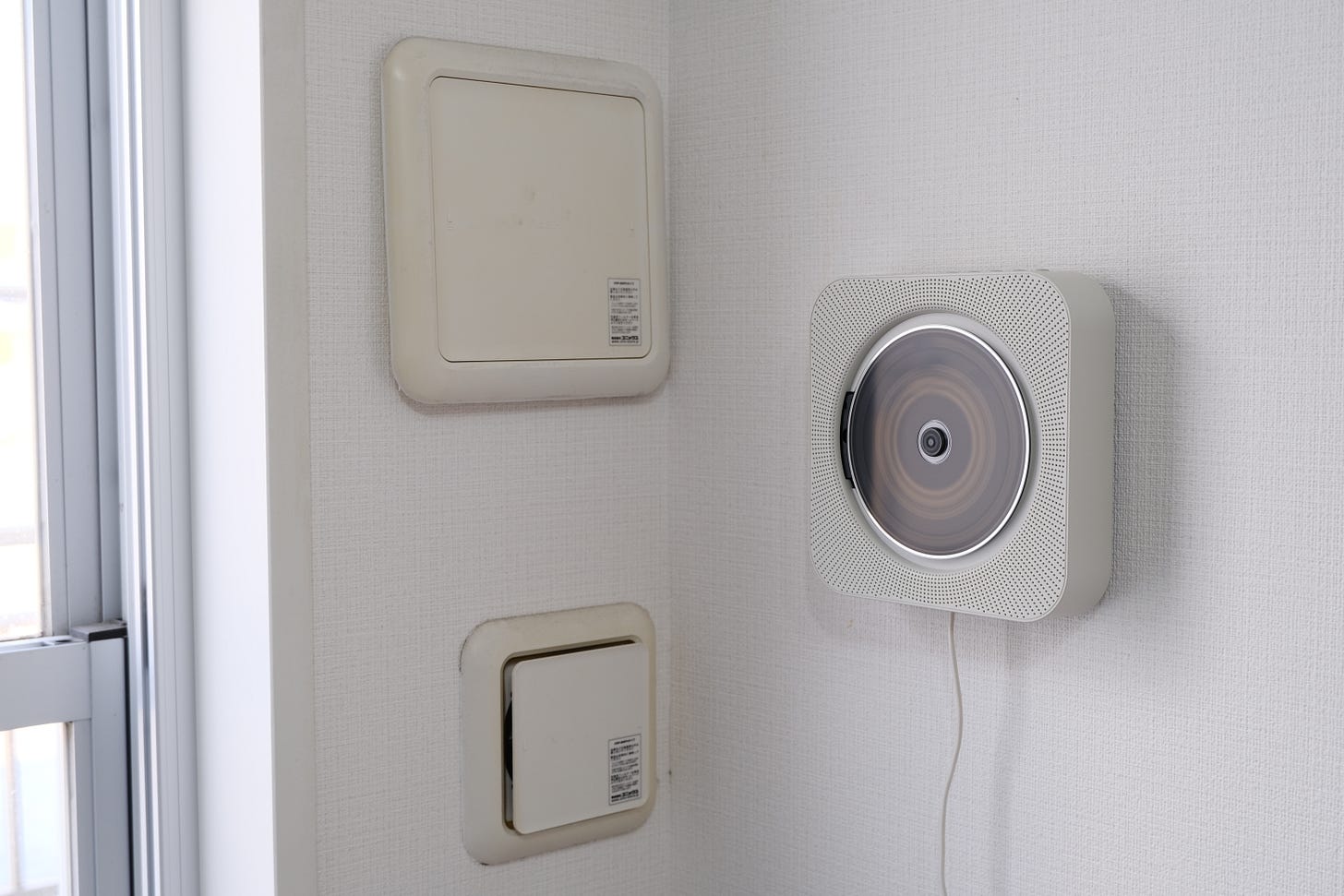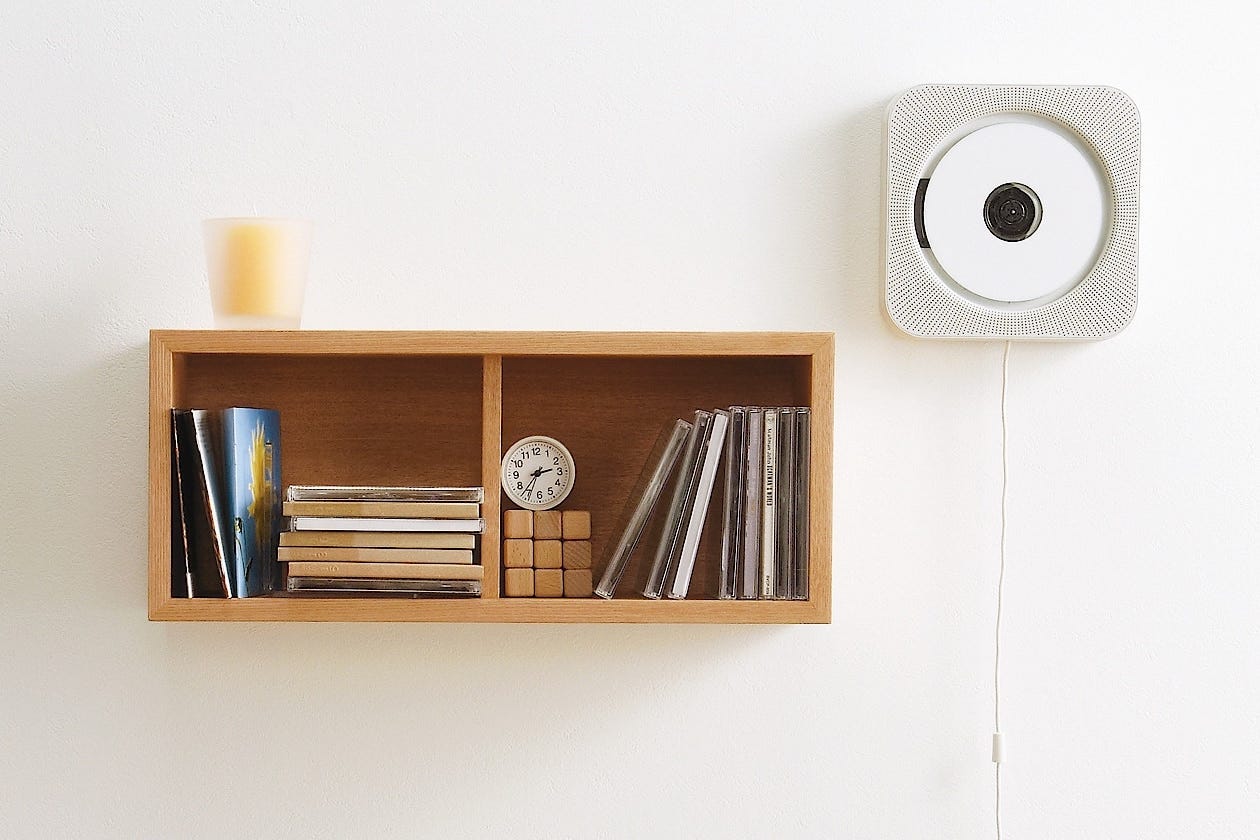Muji Wall-mounted CD Player review
How does Naoto Fukasawa's iconic design hold up in 2023?
After decades of longing, it's 2023 and I just bought a dedicated CD player.
But not just any model. Muji's wall-mounted CD player is a genuinely iconic design that has gone through a few revisions since the 1999 original and remains on sale to this day. It's the work of Naoto Fukasawa, one of Japan's most renowned industrial designers, and it’s arguably his single most famous product; it occupies the front and back cover of the excellent Phaidon retrospective of his career.
I own and use quite a few Fukasawa-designed devices, like a space heater from his +-0 (Plus Minus Zero) brand, the pillowy rice cooker he also created for Muji, and a bunch of gorgeous Infobar phones I can't bear to get rid of despite their obsolescence. I always wanted his wall-mounted CD player, but for whatever reason — concrete apartment walls, the advent of streaming, you name it — never got around to picking one up until now, at a time when I've been reevaluating my home office.
The Muji wall-mounted CD player is an off-white rounded square with the laser apparatus exposed and the speakers located in the lower two corners behind a plastic grille of radiating holes. All of the controls are found on the top edge except for the most important one — you play and stop your disc by tugging on the power cord, which dangles towards the ground and offers a delightful degree of resistance.
Fukasawa writes in the Phaidon book that he was inspired by ventilation fans with blades that start to turn once their cord is pulled, with the wind noise eventually balancing out into a constant flow. The vents in my apartment have a push-in design, but the effect is similar nonetheless, and it felt like the obvious place to hang the CD player even before re-reading Fukasawa's comments on the product.
Mounting is simple. There's an included bracket that's able to support the weight of the CD player against drywall with a few basic push pins, which as far as I can tell is the sole difference between this CPD-4 model (14,900 yen, or about $115) and the previous CPD-3 that only came with screws. That revision also added a remote control and FM radio while boosting audio performance over the first two versions. (I should note that my remote control came with a dead CR2025 watch battery. It worked fine after I swapped the battery out, but I get the feeling this CD player is not doing a whole lot for Muji's sales.)
One thing you won't find is Bluetooth support — it's CD, FM, or bust. Muji did introduce a wall-mounted Bluetooth speaker in 2013, but it was discontinued at some point. That was probably for the best; the flat surface and basic square grille pattern made for a product that was nowhere near as compelling to look at or interact with.
Anyway, I stuck the CPD-4 on my wall and was all set for minimalist design nirvana, the perfect auditory accompaniment to typing this review. I pulled on the power cord and marveled at its chunky resistance, in line with what you'd expect from something with such a precise aesthetic.
As for how it sounds? Well. It does at least look cool.
I did not and should not have expected sonic miracles out of this thing. The space for its 2W speakers is tiny, and it only draws 12W of power overall. The overall output isn't unlistenable, but it's distinctly tinny and unsatisfying. The bigger problem, though, is that I forgot how dang loud CDs are, particularly on players that don't cover them with lids. There's a constant hiss that you have to crank the volume up to impractical levels in order to overcome.
Considering Fukasawa's stated influence of ventilation fans, it makes a degree of sense — this sure does sound like one as well as looking like one, with the noisy spin-up of the disc working its way towards a constant high-pitched whine. But that is still perhaps suboptimal for an audio playback device.
At the same time, I don't think that really matters. This is a design intended for '90s Japan, and a lot of people here listened to CDs far longer than most people elsewhere. When I moved into my current apartment a few years ago, it was under a minute's walk from a Tsutaya, a DVD and CD rental chain. Tsutaya used to sell blank CDs at the cash register under the tacit acknowledgement that customers would burn the music albums they rented before returning them.
I'm more or less all-in on streaming music so never had much interest in that particular use case. (I don't own a CD burner, for one thing.) But my local Tsutaya turned into a generic chain supermarket last year, as part of a wave of nationwide store closures, and now I'm kind of lamenting not getting this Muji CD player before that happened. It would have been neat to pick up, say, the latest Perfume album for a couple of hundred yen and have it spin on my wall in passable quality for a few days before dropping it back through a letterbox.
As a casual music player in the age of CDs, I can see how this would've been a great product. It's undeniably fun to use and looks stylish in its environment. The sound quality would've been reasonable in the 2000s, before compact Bluetooth speakers like the Jawbone Jambox or the UE Boom set the bar for this kind of thing. And there's something to be said for having the disc spin out there in the open as you're playing it, which is also a big part of vinyl's appeal. Without any particular reason to acquire the actual discs, though, it's probably not going to get much practical use in my office.
I'm keeping it on the wall all the same. If nothing else, this is the first dedicated FM radio I've owned in Japan, so perhaps this will be my entry point into a world of entertainment I'm yet to explore. More likely, I'll just look at it every day, admire the thought that went into it, and occasionally pull the cord.





Love it!
Funnily enough, I’ve been buying more CDs recently: video game soundtracks from, guess where, Japan. They are, at best, decoration pieces, so maybe they’d work well with this player.